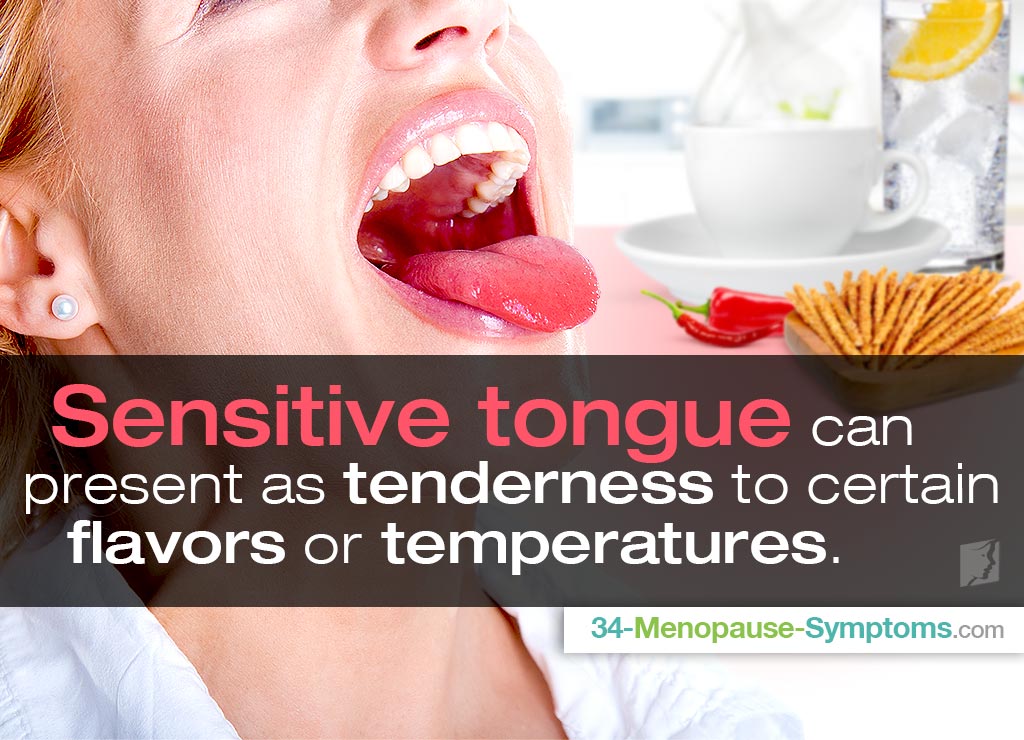Tongue is an important part of the mouth, responsible for the initial processing of food, swallowing, and speech articulation. It is densely covered in taste buds and nerves, which enables it to detect the smallest stimuli, such a taste or pain.
Some menopausal women suffer from an over-sensitive tongue that disables them from enjoying the food or speaking clearly and fluently. This in turn might affect their self-confidence and lead to poor diet. Continue reading to learn why you experience a sensitive tongue and what you can to lessen this unpleasant sensation.
The Symptoms of Sensitive Tongue
The sensation of a sensitive tongue can be described in a number of ways. It can present as tenderness to certain flavors, such as salty or spicy, or temperatures, like hot or cold. It might feel as if the tongue was burned and irritated, sometimes painful.
Many women keep checking the tongue for any abnormalities, for example; redness, swelling, or patches, but in most cases, there are none to be found. Sensitive tongue can be persistent without showing any physical signs.
The Causes of Sensitive Tongue
Sensitive tongue can be idiopathic, which means that its causes are not known, or it can be caused by various systemic disease and certain behavioral choices. They include:
Poor oral hygiene
Smoking and alcohol abuse
Hormonal imbalance due to menopause
Burning mouth syndrome (BMS)
Side effects of medications
Vitamin deficiency
- Vitamin B-complex
- Iron
Infection or inflammation
- Geographic tongue
- Oral thrush
- Herpes simplex
Allergic reaction
- Food
- Food additives
- Medications
- Chemicals in cosmetics, toothpaste, etc.
Systemic diseases
- Thyroid disease
- Mouth ulcers
- Oral cancer
- Diabetes
Injury
- Burns
- Bites or cuts
- Nerve damage
Treatments for Sensitive Tongue
Proper hygiene
The best way to approach a sensitive tongue is to rule those conditions that are easily treatable. It might be helpful to start with improving oral hygiene by brushing your teeth twice a day with baking soda and using a mild, alcohol-free mouth wash after each meal. Your dentist can check for any gums problems or tooth decay that might worsen your tongue sensitivity.
Vitamins and supplements
You might also consider getting a blood test to check for vitamin deficiency, which can be treated either with supplements or a well-balanced diet. The best food sources of vitamin B12 and iron are beef, fish and seafood, legumes, eggs, and cheese.
Medications
Allergies are best treated with avoidance of the substances that trigger the sensitivity. In severe cases, anti-histamines might be prescribed to subside the allergic reaction. Sensitive tongue can also be treated with hormone replacement therapy (HRT), but it involves certain risks and side effects.
Many menopausal women also consider taking natural supplements to balance their fluctuating hormones. Two types that might be effective in alleviating an oversensitive tongue and other menopausal symptoms, such as hot flashes or mood swings, are phytoestrogens, like soy or red clover, and hormone-regulating supplements. Ask to your doctor if these supplements are right for you, and learn what foods to avoid to alleviate the painful sensation of a sensitive and burning tongue.
Sources
- Climacteric. (2015). Efficacy of phytoestrogens for menopausal symptoms: a meta-analysis and systematic review. Retrieved September 27, 2017 from https://www.ncbi.nlm.nih.gov/pmc/articles/PMC4389700/
- Britannica Educational Publishing. (n.d.). Ear, Nose, and Throat. Retrieved September 27, 2017 from https://books.google.com.pe/books?id=leecAAAAQBAJ&pg=PA78&dq=tongue+pain+sensitivity&hl=en&sa=X&redir_esc=y#v=onepage&q=tongue%20pain%20sensitivity&f=false
- National Institute of Dental and Craniofacial Research. (2016). Burning mouth syndrome. Retrieved September 27, 2017 from http://www.nidcr.nih.gov/OralHealth/Topics/Burning/BurningMouthSyndrome.htm
- Rea, W. (1996). Chemical sensitivity. CRC Press: USA.



